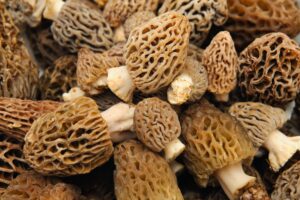By Ryan Maus
Ingredient hazard assessments often include an assessment of natural toxins. Of these, mycotoxins such as aflatoxin are often first to be assessed. However, other naturally occurring toxins exist and have caused foodborne outbreaks in the past few years. These outbreaks involved toxin containing raw morel mushrooms, undercooked kidney beans, and new ingredients such as tara powder. While consumer demands can inspire new food trends, it is important to remember the hazard that naturally occurring toxins present and the controls that can be put in place to reduce the risk of illness.
A recent article describes a 2018 incident in France where an outbreak of acute gastroenteritis occurred at a military base after 200 people ate at a dining facility and became ill. An investigation indicated that chili con carne was the likely source of illnesses. Further analysis indicated that a plant lectin, phytohaemagglutinin, was present in the chili at a level above what is considered a toxic dose. The source of the plant lectin was undercooked kidney beans, a toxin that is destroyed with proper cooking of the beans.
In 2022, numerous customer complaints were made to the manufacturer, the FDA, and the CFSAN Adverse Event Reporting System about illnesses associated with the consumption of Daily Harvest’s French Lentil and Leek Crumbles. The product was eventually recalled and an outbreak investigation undertaken to determine the cause of illnesses. Initially, 393 adverse illness events were reported, including 133 hospitalizations. Illnesses reported involved the gastrointestinal tract, liver, bile ducts, and/or gallbladder. An FDA investigation identified tara protein flour, an ingredient in the product implicated, as an ingredient of interest although non-specific toxin tests, mycotoxin tests, and microbial tests did not identify any results of public health significance. An investigation of the adverse event and the potential role tara protein played in causing illness was published in 2023. The authors found that the original product and tara protein powder ingredient were free from intentional, accidental, and economic adulteration, spiking with synthetics, and toxic compounds. However, three nonprotein amino acids were present at high levels. One of these, baikiain, was present at the highest level and produced a minor metabolite in vivo similar to acetaminophen. When tested using a mouse model at levels relative to consumer consumption, the mice exhibited liver and kidney symptoms similar to an overdose of acetaminophen. The presence of baikiain was theorized to have caused the adverse events seen in consumers, the severity of which depended on the dose of tara consumed and the susceptibility of the individual to the toxin.
In 2023, an outbreak at a sushi restaurant in Montana caused 51 illnesses involving diarrhea, nausea, vomiting, or abdominal pain; and two deaths. An investigation indicated that morel mushrooms were the likely cause of illness. Left over mushrooms tested were found to be true morels and not false morels that contain the toxin gyromitrin, and no significant levels of pesticides, heavy metals, toxins, or pathogens were found. However, documented cases of similar illnesses associated with consumption of raw or undercooked true morel mushrooms have been reported due to low levels of naturally occurring heatlabile hydrazinic toxins in the raw morels. Morels consumed at the restaurant were served raw or lightly cooked.
Food producers need to ensure that proper controls are in place to eliminate toxic hazards, such as cooking. Likewise, new ingredients incorporated into products should be FDA approved and have a history of being safe. More information on natural toxins is available from FDA, WHO, and other sources.


